'The importance of the job of an MP should be recognised'
- Published
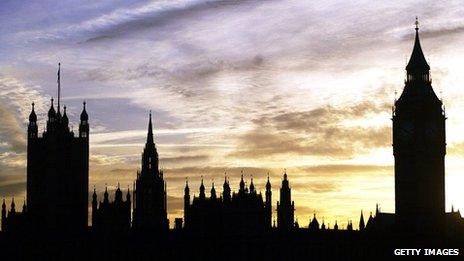
Why is the Independent Parliamentary Standards Authority proposing an 11% salary increase for MPs?
Defining the problem
The Independent Parliamentary Standards Authority (Ipsa) argues that MPs' pay has fallen behind relative to average national earnings.
"There is a pay gap, a problem to be fixed," Ipsa said, as it launched a public consultation in July, external on proposals to change MPs' remuneration.
"These are the 650 people we have chosen to represent us.
"They sit at the pinnacle of our democracy. This is a fact that we ought to record and respect."
In a detailed consultation document, the body set out the factors that had influenced its decision to hand each MP an additional £7,604 each year - and those that had not.
Falling behind
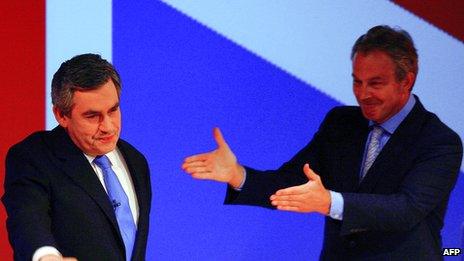
The Senior Salaries Review Body commissioned a detailed review of MPs' pay and allowances in 2007, shortly before Tony Blair stood down as PM
In 2007, the Senior Salaries Review Body found that MPs were paid the equivalent of 85% of the pay of a selection of other public sector professionals. By 2012, this had slipped back to 80%.
The Senior Salaries Review Body called for an increase to £61,820 in 2007. This would now be worth £68,954 if it had gone up in line with average earnings - higher than the current salary of £66,396 - and could be worth £73,365 in 2015 if it continued to go up in line with earnings.
For the greater part of the 20th century, MPs were paid an average of 3.16 times average national earnings. But since 1980, this has slipped to 2.7. A reinstatement of the previous ratio would propel an MP's salary to £83,430 by 2015.
Ipsa determined that it should therefore aim to set a salary for MPs in 2015 of between £73,365 and £83,430.
"The midpoint of this range would take MPs' annual pay to £78,300. However, in the current economic climate, and bearing in mind the impact on the pension liability, we think that a payment of this level is too high.
"We judge that a figure of £74,000 per year, payable after the 2015 general election, is appropriate."
Salaries for comparable jobs
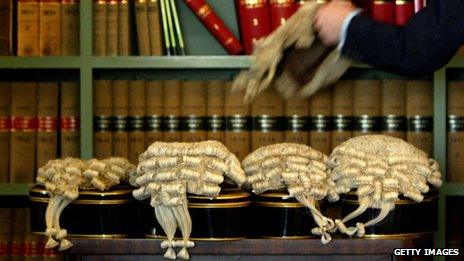
Comparisons with salary levels in other professions - such as the law - were considered, and rejected
Ipsa considered the case for setting MPs' pay in relation to other public or private sector jobs, but said it was "not persuaded" by the merits of such a "simplistic" exercise.
"There is much that is self-serving in recourse to comparators," it explained.
"This or that job is favoured because the salary is roughly what is thought right: the judgement comes first, the most convenient comparator afterwards."
International comparison
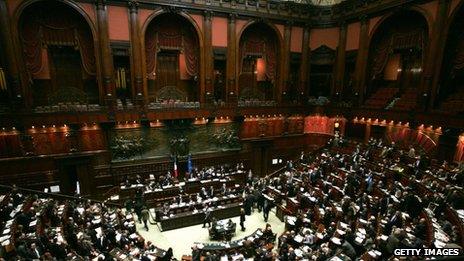
Members of the Italian parliament enjoy lofty salaries compared with UK MPs
Ipsa chairman Sir Ian Kennedy, in an article for the Times newspaper, external, argued that MPs' pay had "fallen behind" compared with salaries for legislators in other parts of the world.
The October 2012 consultation on MPs' pay noted that "precise comparisons are near impossible because the roles and job weights of members of parliament in different countries vary considerably".
Factors affecting this variation include "the number of voters represented, whether the system is unicameral or bicameral, and whether members represent a defined constituency or are elected on a party list", it added, repeating caveats first expressed by the Senior Salaries Review Board in 2007.
The July consultation document did not use an international comparison to justify its proposals, but it did include the following data:
Diversity in Parliament
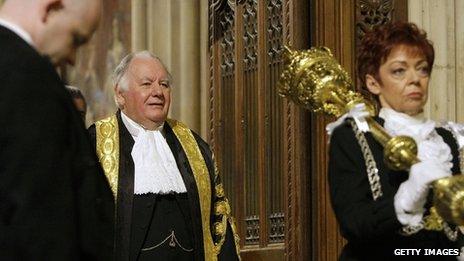
Ex-Commons Speaker Michael Martin was a sheet-metal worker before entering Parliament, but the number of MPs from manufacturing backgrounds has fallen
Ipsa is not convinced by the idea that the current salary levels deterred people from certain sections of society from trying to become an MP.
There was "no evidence", it said, for the claim that "if MPs' pay does not keep up with that of certain professions, or senior roles in the public sector, we risk Parliament returning to the Victorian era, when the majority of MPs were independently wealthy".
Neither had there been a decline in the quality of budding MPs, as far as Ipsa could tell.
"Moreover, many informed observers seem to judge the 2010 cohort of MPs to be of a particularly high calibre. And, of course, they put themselves forward for election with a salary of £65,738 in view."
Compensation for other changes

Installing a new TV at an MP's home is one expense claim Ipsa says it will reject in future
Alongside the salary increase, Ipsa has proposed to abolish some of the other perks currently enjoyed by MPs, such as "resettlement payments" for those leaving Parliament, and expenses to cover as diverse a range of items as evening meals, tea and biscuits, and TV licences.
MPs' pensions are also to be made less generous, moving from a final salary scheme to a career average scheme - in line with reforms to many other pension schemes.
But Ipsa was adamant that the salary hike should not be seen as part of "a series of trade-offs between the component parts of the package".
It noted: "Other public sector workers have not received salary compensation for the reform of their pensions. Nor should MPs.
"The resettlement payment is past its sell-by date and it should go. There is no offsetting increase in pay."
Rather, it declared: "The salary component is justified on its own terms."
Public opinion
In a recent blog post, external, Ipsa chief executive Andrew McDonald said the proposals, "taken as a whole, [would] not cost the taxpayer a penny more" than the current system. "That message has not been heard in the hubbub of the last few days."
Ipsa had canvassed the views of the public extensively in "two full rounds of formal public consultation", he added.
"When asked to weigh the recommendations as a whole - as a complete package - the public view is more sophisticated than many commentators have given them credit for in the past few days.
"Taking the package together, our research suggests that, if the reformed package costs more overall, 58% thought it too generous and 30% thought it about right or not generous enough.
"But, when presented with a similar package which does not cost the taxpayer any extra, public opinion is almost split down the middle: 45% say it would be too generous, and 43% say it is about right or not generous enough.
"This shows us something important: this is an issue where the public has a more nuanced, and split, opinion than the reactive howls of 'outrage' from some commentators and politicians."
- Published11 December 2013
- Published9 December 2013
- Published21 October 2013